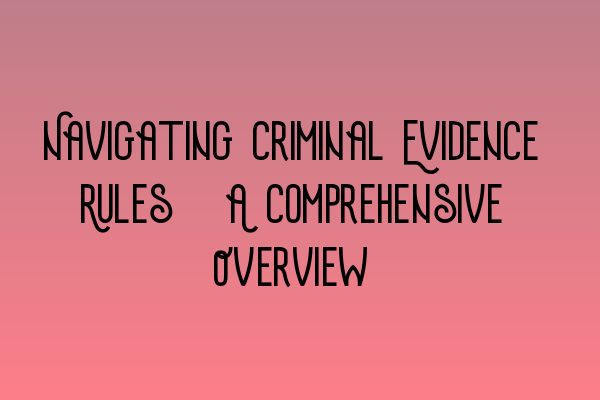Navigating Criminal Evidence Rules: A Comprehensive Overview
Welcome to our comprehensive overview of criminal evidence rules. As criminal solicitors and experts in SQE Criminal Law & Practice Law UK, we understand the importance of understanding and navigating the intricate web of evidence rules in criminal proceedings. The successful navigation of these rules can make a significant difference in the outcome of a case. Whether you’re a practicing solicitor, a law student, or simply interested in criminal law, this article will provide you with the knowledge and insights you need to navigate criminal evidence rules with confidence.
Understanding Criminal Evidence Rules
Before we delve deeper into the intricacies of criminal evidence rules, it’s important to have a solid understanding of the fundamentals. Criminal evidence rules govern the admissibility and exclusion of evidence in criminal proceedings. They ensure that only relevant and reliable evidence is presented in court, while protecting the rights of the accused and maintaining the integrity of the justice system.
The Relevance of Criminal Evidence Rules
Effective understanding and application of criminal evidence rules are crucial in obtaining a favorable outcome for your client. To do so, solicitors need to have a thorough understanding of the various types of evidence, including direct evidence, circumstantial evidence, expert evidence, and hearsay evidence. Each type of evidence has its own set of rules and requirements for admissibility.
For example, direct evidence is considered the most reliable form of evidence, as it directly establishes the fact in question. On the other hand, circumstantial evidence requires the court to draw inferences to establish the fact. Expert evidence, provided by qualified professionals such as forensic scientists or medical experts, requires the expert to have relevant expertise and follow certain guidelines set by the court.
Admissibility and Exclusionary Rules
Admissibility rules determine whether evidence is allowed to be presented in court, while exclusionary rules determine when evidence should be excluded despite its relevance. Some common admissibility and exclusionary rules include:
- The hearsay rule: This rule states that hearsay evidence is generally inadmissible unless it falls within one of the recognized exceptions.
- The best evidence rule: This rule requires the party to present the original document or the best available evidence.
- The exclusion of illegally obtained evidence: This rule prohibits the use of evidence obtained through unlawful searches, seizures, or confessions.
Challenges in Navigating Criminal Evidence Rules
Navigating criminal evidence rules can be challenging due to their complexity and constant evolution. It requires staying up to date with legislative changes, case law, and legal precedents. Additionally, the specific rules may vary depending on the jurisdiction and the type of offense involved.
To navigate these challenges and effectively advocate for your clients, it is essential to have a solid foundation in criminal evidence rules. This includes knowledge of the relevant legislation, an understanding of case law, and the ability to apply these rules strategically to support your arguments in court.
Our Expertise in Criminal Evidence Rules
At SQE Criminal Law & Practice Law UK, we specialize in providing comprehensive training and resources to help solicitors navigate the complexities of criminal evidence rules. Our expert team of solicitors, writers, and SEO professionals are dedicated to ensuring you have the knowledge and skills necessary to excel in your practice.
Whether you’re preparing for the SQE 1 or SQE 2 exams, we offer a range of preparation courses to help you succeed. Our SQE 1 Practice Exam Questions and SQE 1 Practice Mocks FLK1 FLK2 articles are valuable resources to test your knowledge and enhance your understanding of criminal evidence rules.
For aspiring solicitors, our SQE 1 Preparation Courses and SQE 2 Preparation Courses provide comprehensive training in criminal law and practice, including a deep dive into evidence rules. These courses are designed to equip you with the knowledge and skills necessary to excel in your future career.
Stay informed about upcoming SQE exam dates by regularly checking our SRA SQE Exam Dates article. Knowing the exam dates in advance allows you to plan your preparation effectively and ensure you’re fully prepared for success.
Conclusion
Navigating criminal evidence rules is essential for any solicitor or legal professional involved in criminal proceedings. Understanding the intricate details of admissibility, exclusion, and the various types of evidence is crucial for effectively advocating for your clients and achieving favorable outcomes.
At SQE Criminal Law & Practice Law UK, we are committed to providing you with the necessary resources and expertise to excel in your practice. Whether you’re preparing for the SQE exams or looking to enhance your understanding of criminal evidence rules, our courses and articles are designed to meet your needs.
Start your journey to becoming a successful criminal solicitor by exploring our SQE 1 and SQE 2 preparation courses, testing your knowledge with our practice exam questions and mocks, and staying informed about upcoming exam dates. Together, we can navigate the intricacies of criminal evidence rules and achieve justice for our clients.
Disclaimer: This article is for informational purposes only and does not constitute legal advice. It is always recommended to consult a qualified solicitor for advice specific to your case.
Related Articles:
